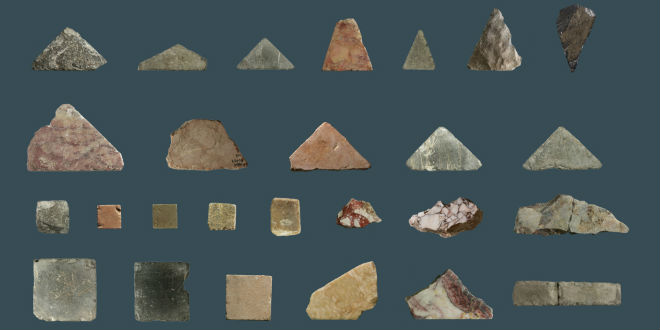An incredible new discovery at the Temple Mount has produced the first-ever physical and archaeological evidence that the Jewish Second Temple stood on the Mount 2,000 years ago, upsetting Arab claims, increasingly endorsed by the international community, that the Temples never existed.
Archaeologists from the Temple Mount Sifting Project, salvaging artifacts from Muslim destruction at the Temple complex, have completed the restoration of ornate floor tiles which experts believe likely decorated the courtyard of the Second Jewish Temple. The project provides visible and incontrovertible proof, backed up by ancient texts and historical context, of a Jewish Temple on the Mount.
In total, archaeological teams have uncovered approximately 600 colored stone floor tile segments, with more than 100 of them positively dated to the Herodian Second Temple period (37-4 BCE).

The importance of the discovery is undeniable.
“This represents the first time that archeologists have been able to successfully restore an element from the Herodian Second Temple complex,” said Zachi Dvira, co-founder and director of the Temple Mount Sifting Project.
The Sifting Project began in the Tzurim Valley National Park in 2004 in an attempt to salvage whatever archaeological artifacts it could from destruction caused by illegal construction projects on the Temple Mount led by the Jordanian Waqf that controls the Mount.
This destruction of irreplaceable archaeological artifacts is considered to be part of a larger trend of Temple denial. Denying Jewish connection to the Temple Mount began at the 2000 Camp David Summit, when the Palestinian Authority Chairman Yasser Arafat insisted that “the Temple” existed near Shechem (Nablus), and not on the Temple Mount in Jerusalem.
This claim has been taken up in the international narrative as UNESCO passed an initiative claiming the Temple Mount as an exclusively Muslim holy site. This claim went mainstream last October when the New York Times published an article questioning whether the two Jewish Temples ever existed at all.

Breaking Israel News asked Dr. Gabriel Barkay, co-founder and director of the Temple Mount Sifting Project, if this first-of-its-kind restoration was absolute proof refuting Temple denial.
“You are asking me if I have proof that water is wet,” he responded emphatically. “I don’t need to prove anything. I found facts.”
Dr. Barkay compared denial of the Jewish Temples to denying the Holocaust. “I myself am a Holocaust survivor, and I couldn’t care less about people who deny what I know to be true. For the Holocaust, we have the camps, we have the films and photographs, and we have the survivors,” he told Breaking Israel News.
“For the Temple, we have the Mishnah (Oral Law), the New Testament, we have the writings of Flavius Josephus (a 1st Century Romano-Jewish historian). We have mountains of archaeological evidence. I don’t want to relate to what is nothing less than a political misuse of history.
“There are people who approach me, especially Europeans, and ask what proof I have there was a Jewish Temple. I say that I don’t have proof and I am not interested in proof,” Dr. Barkay stated. “The fact is there was a Temple. Our discovery simply shows the glory that was the Temple.”
Speaking of proof, the tiles fit perfectly into a description of the Temple complex given by historian Josephus, who saw Temple with his own eyes. He wrote in his work “The Jewish Wars” that “the uncovered [Temple Mount courtyard] was completely paved with stones of various types and colors”.
The find also agrees with Talmudic literature about the construction of the Temple Mount which describes rows of green, blue and white marble. The tile segments, mostly imported from Rome, Asia Minor, Tunisia and Egypt, were made from polished multicolored stones cut in a variety of geometric shapes.

Another point of historical proof is that this style of flooring is consistent with floors found in contemporary works built by Herod, the builder of the Second Temple. Similar flooring has been found at Herod’s palaces in Masada, Herodian, and Jericho, among others. A key characteristic of the Herodian tiles is their size, which corresponds to the Roman foot, approximately 29.6 cm.
The restoration is proof of a theory that large expanses of the Temple Mount during the Second Temple were covered with a special type of ornate flooring called opus sectile, Latin for “cut work.” The idea was first put forward in 2007 by archaeologist Assaf Avraham, director of the Jerusalem Walls National Park. The new discovery confirms it.
“So far, we have succeeded in restoring seven potential designs of the majestic flooring that decorated the buildings of the Temple Mount,” said Frankie Snyder, a member of the Temple Mount Sifting Project’s team of researchers and an expert in the study of ancient Herodian style flooring, explaining that there were no opus sectile floors in Israel prior to the time of King Herod. “The tile segments were perfectly inlaid such that one could not even insert a sharp blade between them.”

Dr. Barkay noted that not only is the find an archaeological treasure, but a way for Jews to connect to their holiest place, which today’s generations can only imagine.
“This represents the first time that we can see with our own eyes the splendor of the flooring that decorated the Second Temple and its annexes 2,000 years ago,” said Dr. Barkay.
“Referring to the Temple that Herod built, the Talmud says that ‘Whoever has not seen Herod’s building has not seen a beautiful building in his life’. Though we have not merited seeing the Temple in its glory, with the discovery and restoration of these unique floor tiles, we are now able to have a deeper understanding and appreciation for the Second Temple, even through this one distinctive characteristic.”

The post For First Time Ever, Archaeological Evidence Proves Jewish Temple Stood on Temple Mount [PHOTOS] appeared first on Breaking Israel News | Israel Latest News, Israel Prophecy News.
Source: Israel in the News


